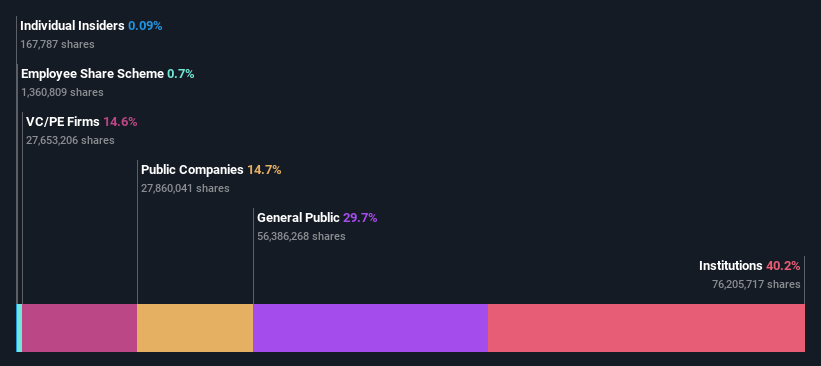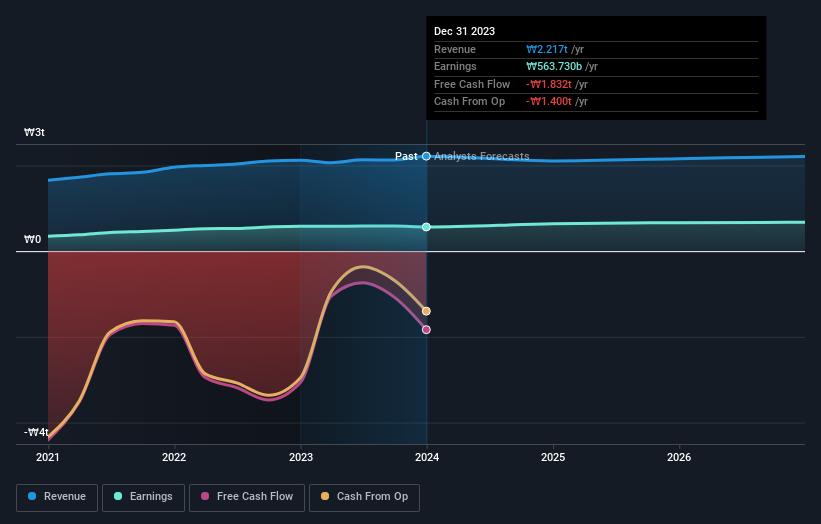Stock Analysis
- South Korea
- /
- Banks
- /
- KOSE:A175330
With 40% ownership in JB Financial Group Co., Ltd. (KRX:175330), institutional investors have a lot riding on the business

Key Insights
- Institutions' substantial holdings in JB Financial Group implies that they have significant influence over the company's share price
- A total of 5 investors have a majority stake in the company with 53% ownership
- Analyst forecasts along with ownership data serve to give a strong idea about prospects for a business
A look at the shareholders of JB Financial Group Co., Ltd. (KRX:175330) can tell us which group is most powerful. The group holding the most number of shares in the company, around 40% to be precise, is institutions. In other words, the group stands to gain the most (or lose the most) from their investment into the company.
And things are looking up for institutional investors after the company gained ₩152b in market cap last week. The one-year return on investment is currently 73% and last week's gain would have been more than welcomed.
In the chart below, we zoom in on the different ownership groups of JB Financial Group.
See our latest analysis for JB Financial Group

What Does The Institutional Ownership Tell Us About JB Financial Group?
Institutions typically measure themselves against a benchmark when reporting to their own investors, so they often become more enthusiastic about a stock once it's included in a major index. We would expect most companies to have some institutions on the register, especially if they are growing.
As you can see, institutional investors have a fair amount of stake in JB Financial Group. This suggests some credibility amongst professional investors. But we can't rely on that fact alone since institutions make bad investments sometimes, just like everyone does. If multiple institutions change their view on a stock at the same time, you could see the share price drop fast. It's therefore worth looking at JB Financial Group's earnings history below. Of course, the future is what really matters.

We note that hedge funds don't have a meaningful investment in JB Financial Group. Samyang Holdings Corporation is currently the largest shareholder, with 15% of shares outstanding. In comparison, the second and third largest shareholders hold about 15% and 11% of the stock.
To make our study more interesting, we found that the top 5 shareholders control more than half of the company which implies that this group has considerable sway over the company's decision-making.
While it makes sense to study institutional ownership data for a company, it also makes sense to study analyst sentiments to know which way the wind is blowing. There are plenty of analysts covering the stock, so it might be worth seeing what they are forecasting, too.
Insider Ownership Of JB Financial Group
While the precise definition of an insider can be subjective, almost everyone considers board members to be insiders. The company management answer to the board and the latter should represent the interests of shareholders. Notably, sometimes top-level managers are on the board themselves.
Insider ownership is positive when it signals leadership are thinking like the true owners of the company. However, high insider ownership can also give immense power to a small group within the company. This can be negative in some circumstances.
Our information suggests that JB Financial Group Co., Ltd. insiders own under 1% of the company. It is a pretty big company, so it would be possible for board members to own a meaningful interest in the company, without owning much of a proportional interest. In this case, they own around ₩2.2b worth of shares (at current prices). Arguably, recent buying and selling is just as important to consider. You can click here to see if insiders have been buying or selling.
General Public Ownership
The general public, who are usually individual investors, hold a 30% stake in JB Financial Group. This size of ownership, while considerable, may not be enough to change company policy if the decision is not in sync with other large shareholders.
Private Equity Ownership
Private equity firms hold a 15% stake in JB Financial Group. This suggests they can be influential in key policy decisions. Sometimes we see private equity stick around for the long term, but generally speaking they have a shorter investment horizon and -- as the name suggests -- don't invest in public companies much. After some time they may look to sell and redeploy capital elsewhere.
Public Company Ownership
It appears to us that public companies own 15% of JB Financial Group. This may be a strategic interest and the two companies may have related business interests. It could be that they have de-merged. This holding is probably worth investigating further.
Next Steps:
I find it very interesting to look at who exactly owns a company. But to truly gain insight, we need to consider other information, too. To that end, you should be aware of the 1 warning sign we've spotted with JB Financial Group .
If you would prefer discover what analysts are predicting in terms of future growth, do not miss this free report on analyst forecasts.
NB: Figures in this article are calculated using data from the last twelve months, which refer to the 12-month period ending on the last date of the month the financial statement is dated. This may not be consistent with full year annual report figures.
Valuation is complex, but we're helping make it simple.
Find out whether JB Financial Group is potentially over or undervalued by checking out our comprehensive analysis, which includes fair value estimates, risks and warnings, dividends, insider transactions and financial health.
View the Free AnalysisHave feedback on this article? Concerned about the content? Get in touch with us directly. Alternatively, email editorial-team (at) simplywallst.com.
This article by Simply Wall St is general in nature. We provide commentary based on historical data and analyst forecasts only using an unbiased methodology and our articles are not intended to be financial advice. It does not constitute a recommendation to buy or sell any stock, and does not take account of your objectives, or your financial situation. We aim to bring you long-term focused analysis driven by fundamental data. Note that our analysis may not factor in the latest price-sensitive company announcements or qualitative material. Simply Wall St has no position in any stocks mentioned.
About KOSE:A175330
JB Financial Group
Through its subsidiaries, provides banking products and services in South Korea and internationally.
Undervalued with adequate balance sheet and pays a dividend.


